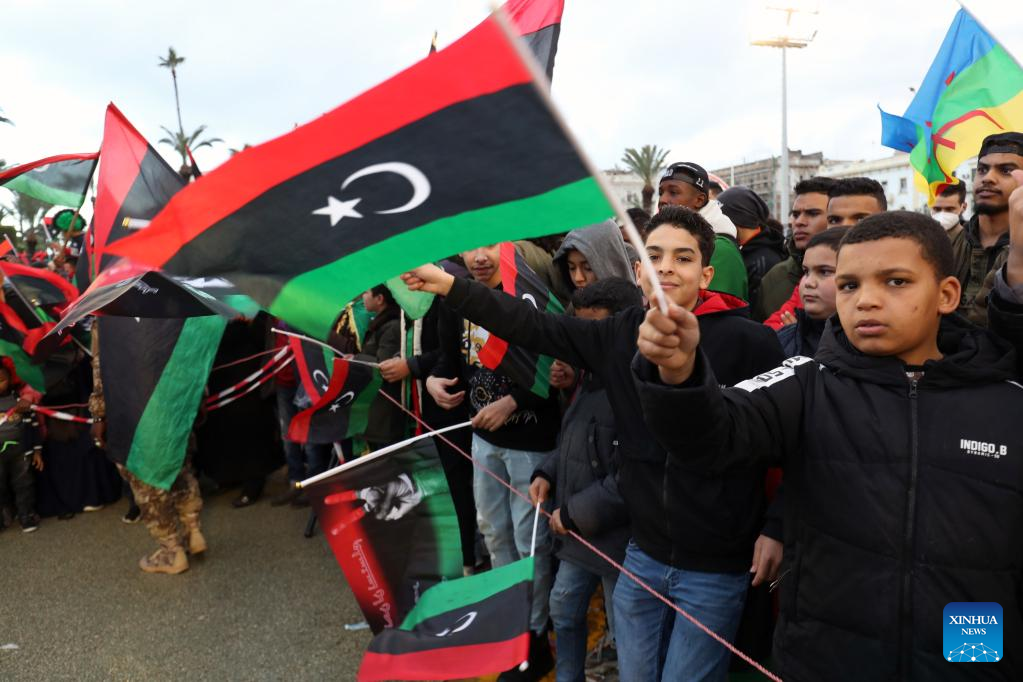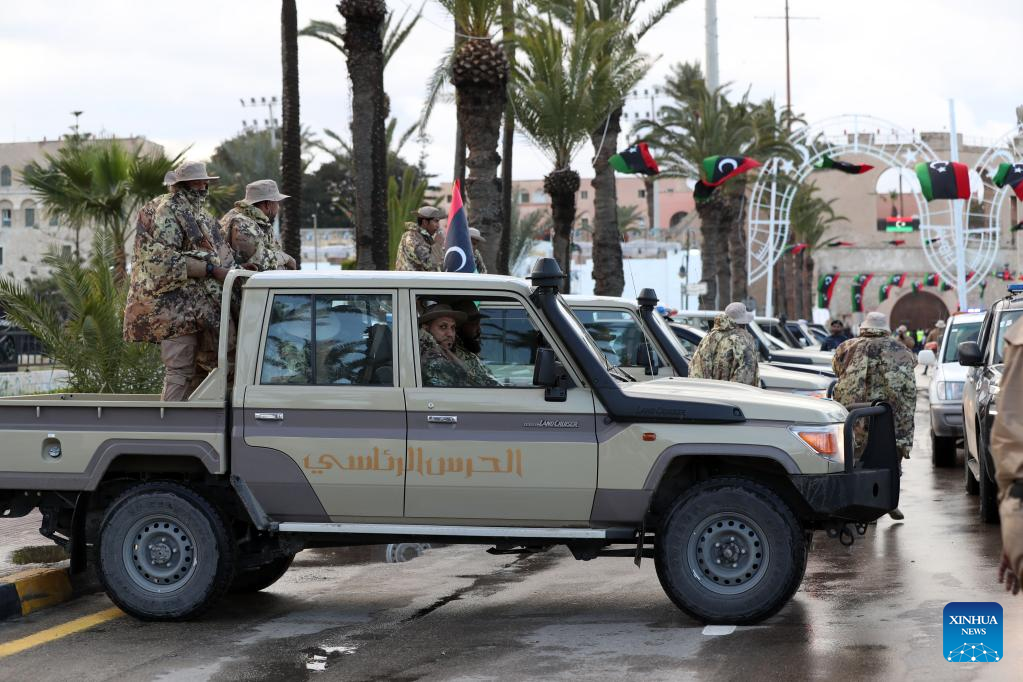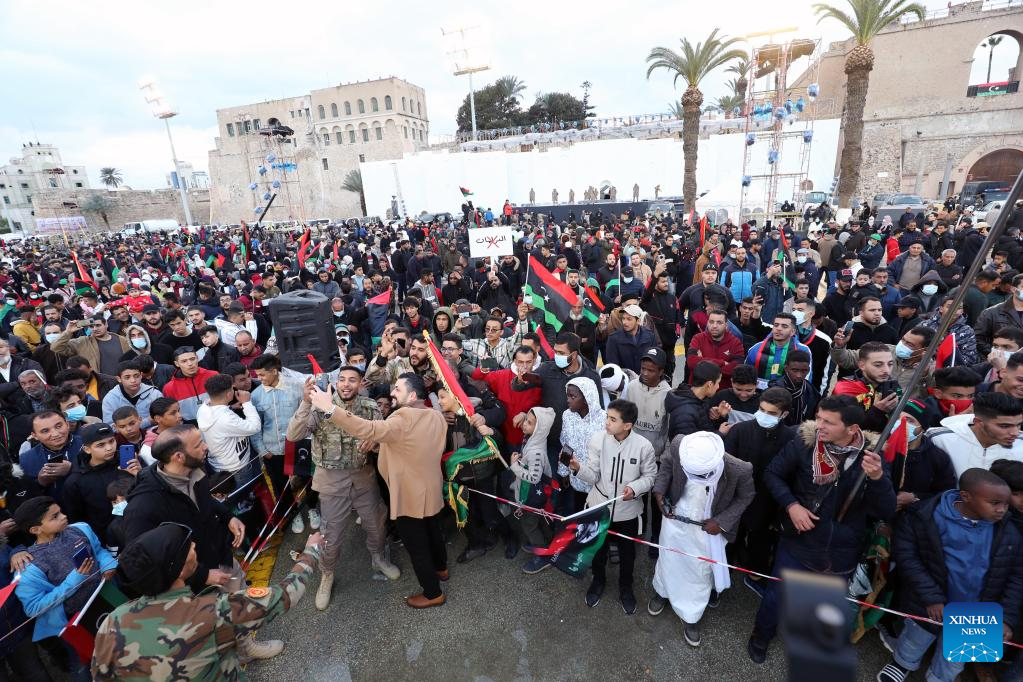
People gather at an event marking the 11th anniversary of the Libyan uprising in Tripoli, Libya, on Feb. 17, 2022. Eleven years have passed since the 2011 Libyan uprising, yet the country is still suffering from insecurity, chaos and instability. (Photo by Hamza Turkia/Xinhua)
TRIPOLI, Feb. 17 (Xinhua) -- Mohamed al-Magtouf, a 31-year-old Libyan man from the western city of Zawiya, took part in the toppling of former leader Muammar Gaddafi in 2011. Now, he only counts on new elections to end the "endless" transitional stages and instability.
Eleven years have passed since the 2011 Libyan uprising, yet the country is still suffering from insecurity, chaos and instability. This has upset many Libyans like al-Magtouf, who used to think that Gaddafi's downfall would bring about a better life.
"When my brothers and I took to the streets and called for the overthrow of the regime (in 2011), the goal was to achieve a change for the better and build a civil state that believes in the peaceful transition of power. Every year, things get worse and we, the Libyans, are victims of the conflict between politicians that hold on to power," al-Magtouf said.
Al-Magtouf graduated from university five years ago and obtained a degree in dentistry. However, he is now unemployed in the oil-rich country that is suffering poor economic conditions and plagued by escalating violence.
"Like many young people, I am unemployed. As long as the fight for power continues, there will be no real sustainable peace and economic growth. Therefore, the people become poorer," he said.
"We only want general elections that make the country united and strong, make the conflict history, and do not push us into regret over what happened to our country," al-Magtouf added.
But, to al-Magtouf's disappointment, the Libyan general elections originally scheduled in later last year were indefinitely postponed due to the deep differences among political factions that have long divided the country.
Nuzha al-Abdali, an architect from the eastern city of Benghazi, shared al-Magtouf's opinion.
"All the politicians do not want elections because this would eliminate them from power. Therefore, they always come up with illogical proposals, the goal of which is to keep them in power as long as possible," she said.
"After we were so close to electing a new authority, they (politicians) destroyed the dream and sabotaged a historic opportunity that perhaps will not come again," al-Abdali added.
The Libyan elections are part of a roadmap adopted by the UN-sponsored Libyan Political Dialogue Forum, which aimed at restoring peace to the country after years of political turmoil and violence.
The House of Representatives, or the parliament, recently voted to appoint Fathi Bashagha, the former interior minister, as the new prime minister to replace the incumbent Prime Minister Abdul-Hamid Dbeibah.
However, Dbeibah vowed that his government will remain in office until the elections are held and will only hand over power to an elected government.
Khairi al-Madhouni, a Libyan teacher from the western city of Sabratha, said he and his children would got out to celebrate the 11th anniversary of the 2011 revolution, while demanding "all the current political bodies leave and not deprive us of electing those who we consider able to fix what they broke in the past years."
"When nearly 3 million Libyans registered to vote for the elections, they showed their desire for change, and that they will not allow the most important goals of the revolution to be stolen. Those goals are the peaceful transition of power and resorting to elections to solve conflicts," al-Madhouni said. ■

Security personnel are seen during an event marking the 11th anniversary of the Libyan uprising in Tripoli, Libya, on Feb. 17, 2022. Eleven years have passed since the 2011 Libyan uprising, yet the country is still suffering from insecurity, chaos and instability. (Photo by Hamza Turkia/Xinhua)

People gather at an event marking the 11th anniversary of the Libyan uprising in Tripoli, Libya, on Feb. 17, 2022. Eleven years have passed since the 2011 Libyan uprising, yet the country is still suffering from insecurity, chaos and instability. (Photo by Hamza Turkia/Xinhua)



